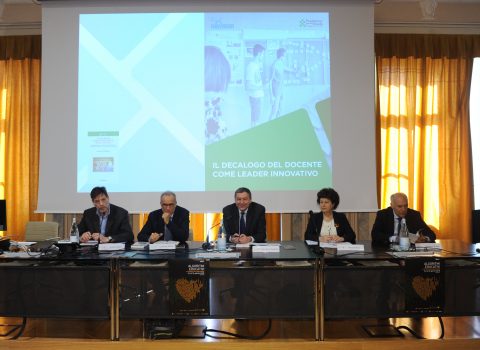
EDIT- ESPERIENZE DIDATTICHE INSIEME AL TERRITORIO: THE NEW PLATFORM IS NOW ONLINE
A new tool to monitor School-to-Work activities
EDIT – Esperienze Didattiche Insieme al Territorio (in English, Educational experiences together with the local systems) is the name of the new platform, designed by Fondazione Bruno Kessler in partnership with the Education and Culture Department of the Autonomous Province of Trento that targets Trentino students in the last three-years of high school, aimed at managing and monitoring School-to-Work Program activities in real time. The application is the result of a synergy effort that involved students, schools and local authorities.
| As of the current school year, Trentino students in the last three years of high school will be able to manage their School-to-Work Program in an intelligent and fast manner using the EDIT – Esperienze Didattiche Insieme al Territorio qpplication. The service was developed by Fondazione Bruno Kessler together with the Education and Culture Department of the Autonomous Province of Trento.
The EDIT platform is a tool designed for and with students, schools and local authorities. Created to help players involved meet each other, EDIT allows users to manage and monitor School-to-Work activities in real time, as well as to provide support with the collection and enhancement of skills acquired by the students and related experiences. The project saw the involvement in the experimentation, right from its early stages, of four high schools: the “Guglielmo Marconi” Technological Institute (Rovereto), the “Felice e Gregorio Fontana” Technical, Economic and Technological Institute (Rovereto), the Celestino Endrici Collegio Arcivescovile (Trento) and the “Martino Martini” high school (Mezzolombardo). Students, teachers and representatives of some Trentino institutions co-designed, together with the researchers of Fondazione Bruno Kessler, the three modules that make up the service: EDIT-Student, EDIT-School, EDIT-Organization. The first module, EDIT-Studente, is a web-app where students can view all the information relating to their three-year School-to-Work program, including information relating to the host institution. During their school-to-work activities, they can enter the hours worked and fill in the daily logbook. The EDIT-Scuola module is the School-to-work program management service used by schools to plan, assign, activate, monitor, report and archive the activities of the students involved. It is an innovative management system that favors communication between schools, students and institutions and allows to optimize spontaneous synergies between schools, companies and the local community, also tracing and enhancing skills and competences beyond specific curricula. Finally, EDIT-Ente allows the organizations involved in the internships to monitor the progress of students who are having a work experience with them. Organizations are thus directly connected with the schools and the kids who are having a work experience with them, greatly simplifying the bureaucracy involved in starting and managing the School-to-work experience and helping demand meet offer. The design and development process that led to the three modules was based on collaborative design, following an incremental approach so that final users (students) and stakeholders (teachers, families and sector experts), in addition to being involved in the design from the earliest stages of the project according to the principles of User-Centered Design, were able to outline their needs for use and provide feedback on the solutions proposed, allowing a progressive and constant improvement of the systems, until their final release. Therefore, at the end of this process, users find themselves able to use the service that they themselves have co-designed, and which therefore best meets their expectations and needs. The EDIT platform is part of the broader and long-term vision of digital support for the school community offered by the “Cartella dello studente” project, also promoted by FBK in collaboration with the Department of Education and Culture. The aim of the project is the development of a single tool that can enhance the skills and aspirations of students, on which they will later build their professional career paths. |
